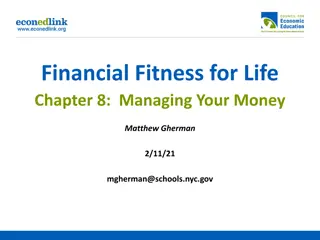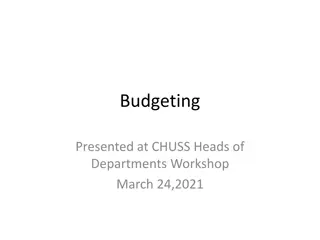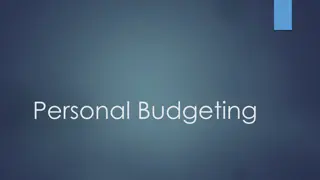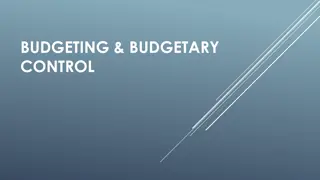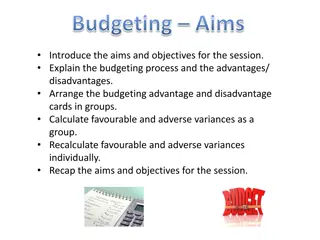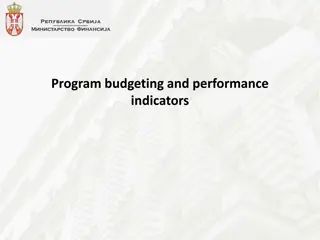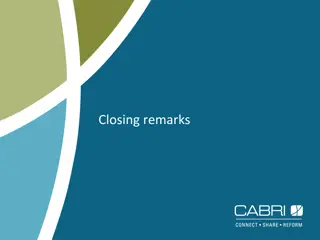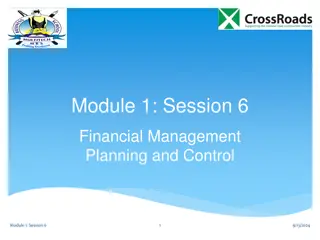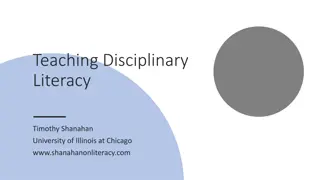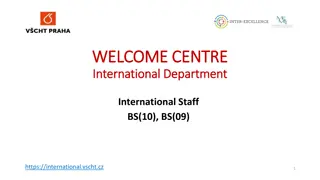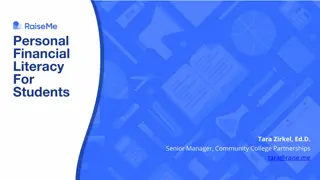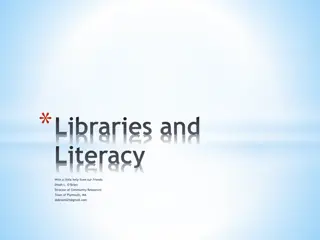Financial Literacy and Budgeting Guide for Temporary Furloughed Employees
This guide provides information on dealing with temporary furloughs due to COVID-19, missed payments, budgeting tips, and steps to manage finances effectively. Learn how to assess income sources, analyze historical expenses, and create a budget to navigate financial challenges during uncertain times.
Download Presentation

Please find below an Image/Link to download the presentation.
The content on the website is provided AS IS for your information and personal use only. It may not be sold, licensed, or shared on other websites without obtaining consent from the author. Download presentation by click this link. If you encounter any issues during the download, it is possible that the publisher has removed the file from their server.
E N D
Presentation Transcript
WVU Temporary Furlough* COVID-19 Financial Literacy The Center for Financial Literacy & Education Dr. Naomi Boyd * A temporary furlough is defined as a temporary reduction in force with an expectation of returning to work. The Center for Financial Literacy and Education
Missed Payments Employees who are affected by the temporary furlough will miss benefits deduction payments since they will not be receiving a paycheck from WVU The effective date of the temporary furlough period is May 24, 2020 Return to work June 28 the following paychecks will be missed during the temporary furlough period: o June 19 o July 3 o July 17 - one week of pay missed Return to work June 28 the following paychecks will be missed during the temporary furlough period: o June 19 o July 3 o July 17 o July 31 (deduction holiday) o August 14 - one week of pay missed
Budgeting 101 Most families do not have a budget Budgeting aids in: Planning for controlling cash inflows and outflows Allocating dollar amounts for different spending categories Controlling consumption and increasing savings
Step 1: Determining Sources of Income Estimate anticipated income from all sources: Income or cash inflows: o Wages, salary, bonuses, tips, commissions before tax or automatic investments o Other sources: family income, government payments (veterans benefits, welfare, unemployment), investment income Subtract federal, state, social security taxes from earnings to calculate your take-home pay View your Pay Statement at portal.wvu.edu under the MyHR tab to see your bi-weekly income Use paycheckcity.com to estimate your take home pay while furloughed
Step 2: Historical Analysis Estimate fixed and variable expenses Compile one year's worth of bank and credit card statements Create a spreadsheet of all expenditures by month and by category o TIP: Most credit card companies do this for you and can be downloaded from your online account Once the dollar amounts are determined by category and month, calculate these as a percentage of gross income Analyze each category to budget for future expenses
Strategies for Budgeting Adjusting the timing of cash inflows and outflows Analyze your budget, picking out specific expenditure categories that you can control Utilities Telephone/cell phone Cable Food Clothing Entertainment
Morgantown Utility Providers MonPower Suspending all service shutoffs for past-due accounts. They will NOT resume normal collections or shut-off activity until at least July 1, 2020 If you have trouble paying your bill, there are various payment options available https://www.firstenergycorp.com/help/safety/coronavirus.html Morgantown Utility Board (MUB) Discontinuing all water shutoffs and Late fees will not be applied Reconnecting all customers who experienced a disconnection due to late payments without charge There will be no interest fees charged to late accounts What is I m unable to pay my MUB bill? Call MUB and let them know as soon as possible https://mub.org/pages/covid19 Dominion Energy Will not disconnect your service for nonpayment Reconnecting residential customers whose services were recently shut off. If you ve fallen behind on your bill, you can contact them about setting up a payment arrangement With more people working from home, it is import to save energy to reduce high bills. o Tips for saving energy while working from home https://www.dominionenergy.com/company/coronavirus
Debt Relief: What Questions Can I Ask? 1. Can I skip or defer a payment? 2. Will you waive my late fee? 3. Will you lower my interest rate? 4. Will you increase my credit limit? 5. Will you refund the points or miles I used to book a canceled trip?
Debt Relief Companies have implemented assistance programs for customers who would like to request debt relief These companies have created COVID-19 support pages that offers advice on how to manage your accounts online Visit their website to see if you are eligible to request relief A great resource to directly link you to company s COVID support pages: o https://www.experian.com/blogs/ask-experian/covid-19-resource/
Managing Debt Change payment dates to align with income inflows Make minimum payments Familiarize yourself with the interest rates on any outstanding balances Can you refinance or consolidate to lower your payments? Focus on paying off debt with higher interest rates
Federal Student Loans Your payments will automatically stop March 13, 2020, through Sept. 20, 2020 Federal student loan borrowers are automatically being placed in an administrative forbearance, which allows you to temporarily stop making your monthly loan payment If you want to continue making payments, contact your loan servicer to opt out of the administrative forbearance, and your auto-debit payments will resume Interest is being temporarily set at 0% on federal student loans https://studentaid.gov/announcements-events/coronavirus
Contact Info Dr. Naomi Boyd naomi.boyd@mail.wvu.edu CFLE Website https://business.wvu.edu/research- outreach/center-for-financial-literacy-and- education



